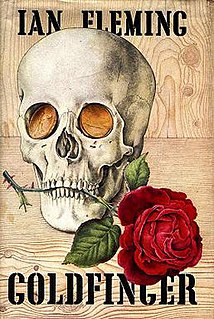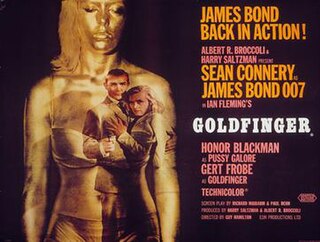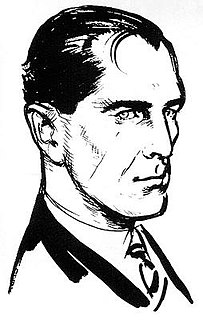
The James Bond series focuses on a fictional British Secret Service agent created in 1953 by writer Ian Fleming, who featured him in twelve novels and two short-story collections. Since Fleming's death in 1964, eight other authors have written authorised Bond novels or novelizations: Kingsley Amis, Christopher Wood, John Gardner, Raymond Benson, Sebastian Faulks, Jeffery Deaver, William Boyd and Anthony Horowitz. The latest novel is Forever and a Day by Anthony Horowitz, published in May 2018. Additionally Charlie Higson wrote a series on a young James Bond, and Kate Westbrook wrote three novels based on the diaries of a recurring series character, Moneypenny.

Ian Lancaster Fleming was an English author, journalist and naval intelligence officer who is best known for his James Bond series of spy novels. Fleming came from a wealthy family connected to the merchant bank Robert Fleming & Co., and his father was the Member of Parliament for Henley from 1910 until his death on the Western Front in 1917. Educated at Eton, Sandhurst and, briefly, the universities of Munich and Geneva, Fleming moved through several jobs before he started writing.

From Russia, with Love is the fifth novel by the English author Ian Fleming to feature his fictional British Secret Service agent James Bond. Fleming wrote the story in early 1956 at his Goldeneye estate in Jamaica; at the time he thought it might be his final Bond book. The novel was first published in the United Kingdom by Jonathan Cape on 8 April 1957.
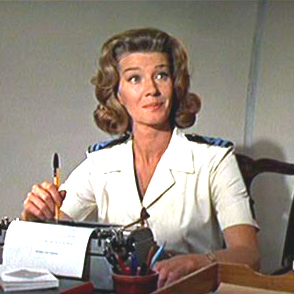
Miss Moneypenny, later assigned the first names of Eve or Jane, is a fictional character in the James Bond novels and films. She is secretary to M, who is Bond's superior officer and head of the British Secret Intelligence Service (MI6). Although she has a small part in most of the films, it is always highlighted by the underscored romantic tension between her and Bond. On that note, she is not always considered to be a Bond girl, having never had anything more than a professional relationship with Bond.

The Man with the Golden Gun is the twelfth novel of Ian Fleming's James Bond series. It was first published by Jonathan Cape in the UK on 1 April 1965, eight months after the author's death. The novel was not as detailed or polished as the others in the series, leading to poor but polite reviews. Despite that, the book was a best-seller.

Felix Leiter is a fictional character created by Ian Fleming in the James Bond series. The character is an operative for the CIA and Bond's friend. After losing a leg and his hand to a shark attack, Leiter joined the Pinkerton Detective Agency. The name "Felix" comes from the middle name of Fleming's friend Ivar Bryce, while the name "Leiter" was the surname of Fleming's friend Marion Oates Leiter Charles, then wife of Thomas Leiter.

A Bond girl is a character who is an attractive love interest or female sidekick of James Bond in a novel, film, or video game. Bond girls occasionally have names that are double entendres or puns, such as Pussy Galore, Plenty O'Toole, Xenia Onatopp, or Holly Goodhead.
SMERSH is a Soviet counterintelligence agency featured in Ian Fleming's early James Bond novels as agent 007's nemesis. It is a fictionalised version of the real SMERSH organisation, which existed from 1943 to 1946. The name is a portmanteau of two Russian words: "SMERt' SHpionam" [Смерть Шпионам, Směrť Špionam], meaning "Death to Spies".

Auric Goldfinger is a fictional character and the main antagonist in the James Bond film Goldfinger, based on Ian Fleming's novel of the same name. His first name, Auric, is an adjective meaning of gold. Fleming chose the name to commemorate the architect Ernő Goldfinger, who had built his home in Hampstead, near Fleming's; it is possible, though unlikely, that he disliked Goldfinger's style of architecture and destruction of Victorian terraces and decided to name a memorable villain after him. According to a 1965 Forbes article and The New York Times, the Goldfinger persona was based on gold mining magnate Charles W. Engelhard, Jr.
A number of real-life inspirations have been suggested for James Bond, the fictional character created in 1953 by British author, journalist and Naval Intelligence officer Ian Fleming; Bond appeared in twelve novels and nine short stories by Fleming, as well as a number of continuation novels and twenty-six films, with seven actors playing the role of Bond.
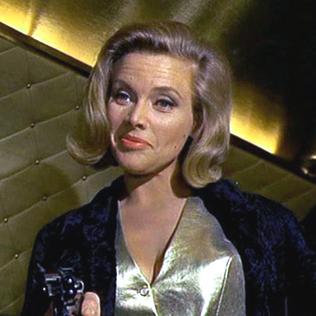
Pussy Galore is a fictional character in the 1959 Ian Fleming James Bond novel Goldfinger and the 1964 film of the same name. In the film, she is played by Honor Blackman. The character returns in the 2015 Bond continuation novel Trigger Mortis by Anthony Horowitz, set in the 1950s two weeks after the events of Goldfinger.
Starting in 1958 and continuing to 1983, James Bond was a comic strip that was based on the eponymous, fictional character created by author Ian Fleming. It consisted of 52 story arcs that were syndicated in British newspapers, seven of which were initially published abroad.

"Shaken, not stirred" is a catchphrase of Ian Fleming's fictional British Secret Service agent James Bond and describes his preference for the preparation of his martini cocktails.
In Ian Fleming's James Bond novels and the derived films, the 00 Section of MI6 is considered the secret service's elite. A 00 is a field agent that holds a licence to kill in the field, at his or her discretion, to complete any mission. The novel Moonraker establishes that the section routinely has three agents concurrently; the film series, beginning with Thunderball, establishes the number of 00 agents at a minimum of 9, with the likelihood of more.

Devil May Care is a James Bond continuation novel written by Sebastian Faulks. It was published in the UK by Penguin Books on 28 May 2008, the 100th anniversary of the birth of Ian Fleming, the creator of Bond. The story centres on Bond's investigation into Dr Julius Gorner, a megalomaniac chemist with a deep-seated hatred of England.

Commander James Bond, CMG, RNVR, is a fictional character created by British journalist and novelist Ian Fleming in 1953. He is the protagonist of the James Bond series of novels, films, comics and video games. Fleming wrote twelve Bond novels and two short story collections. His final two books—The Man with the Golden Gun (1965) and Octopussy and The Living Daylights (1966)—were published posthumously.
The following outline is provided as an overview of and topical guide to James Bond:
